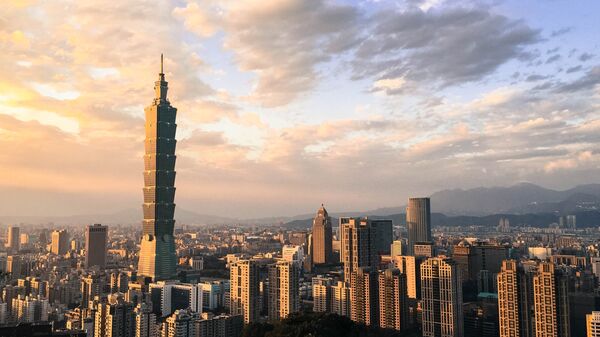Taiwan has dropped the country’s formal name - the Republic of China - from the front of its passports in order to eliminate casual confusion with the People’s Republic of China. Meanwhile, the US State Department has removed “self-imposed” barriers to US contact with Taiwanese officials, infuriating the government in Beijing.
On Monday, Taiwan rolled out the first passports with a new design that highlights the name “Taiwan” by eliminating the English-language text saying “Republic of China” at the top.
今天是歐盟對台灣護照免簽生效1️⃣0️⃣週年也是放大「TAIWAN」字樣新版護照發行日🎊
— Taiwan in the EU and Belgium (@TaiwanEU) January 11, 2021
歡迎大家預約趕快手刀辦起來💕
Today's the🔟th anniversary of the European visa exemption to Taiwanese passport holders🎊
And the new #TaiwanPassport is being issued from today🥳
➡️ https://t.co/FffXzD3ng2 pic.twitter.com/yykKnQrIW5
“The purpose is to increase the visibility of Taiwan so that our people will not be mistakenly identified as coming from China when they travel abroad,” Taiwan Bureau of Consular Affairs Director General Phoebe Yeh told Reuters on Monday.
Reuters noted that during the early stages of the COVID-19 pandemic, while the outbreak was primarily confined to China, Taiwanese citizens traveling abroad encountered problems when they were mistaken for Chinese citizens and barred entry under COVID-related travel bans.
The new passport still says Republic of China in Chinese across the top, but the name only appears in English in small text as part of the seal that adorns the center of the cover.
The move follows a decision last month to change passport entry and export stamps from a design featuring a plum blossom, Taiwan’s national flower, to one that incorporates the outline of the island, according to Taiwan News.
Entry and exit stamps for #passports will soon feature a map of #Taiwan including a few symbolic details. https://t.co/WFVo9KvjNx pic.twitter.com/1TC4bxbU9V
— Taiwan News (@TaiwanNews886) December 26, 2020
The government in Taiwan once ruled all of China, in the years after the last Chinese emperor, Pu Yi, abdicated in 1912 and a republic was declared. However, after the government lost the civil war against communist forces in 1949, which declared a People’s Republic of China in Beijing, the Republican government survived only in Taiwan, which was relatively secure from invasion. Since then, both governments have claimed to be the sole legitimate representative of the Chinese people.
The US switched its recognition from Taipei to Beijing in 1978 as part of its opening of formal relations with China, although the Taiwan Relations Act spelled out how Washington would continue to informally support the capitalist government in Taipei in its fight to retain independence from Beijing. However, part of that recognition also meant accepting Beijing’s position that Taiwan is a rebellious province of China and not a separate country.
On Saturday, US Secretary of State Mike Pompeo announced he was discarding all “self-imposed restrictions” on the interactions of US officials with their Taiwanese counterparts, saying they had been adopted “in an attempt to appease the Communist regime in Beijing.”
However, the State Department’s move doesn’t shred the Taiwan Relations Act, and the release notes that the American Institute in Taiwan (AIT) remains the only avenue for executive branch relations with Taiwan.
Numerous and unprecedented high-profile visits by US officials to the island in recent months have troubled US relations with Beijing, as have a slew of new proposed arms sales including missiles, advanced fighter jets and combat drones. Later this week, US Ambassador to the United Nations Kelly Craft is expected to touch down on Taiwan.
The Global Times, a publication owned by the Communist Party of China’s People’s Daily newspaper, criticized Pompeo’s move as “once again straining the China-US relationship and pushing the Taiwan question deeper down the road of no return.”
“Such a move is tantamount to committing a crime to structurally damage peace in the Taiwan Straits and jeopardize China-US efforts to keep the bottom line stable,” the Times editors wrote on Sunday. “The dire consequences will be beyond anyone's predictions.”
“In order to push the incoming Biden administration to overthrow the decisions made in the incumbent government's last-ditch madness and prevent politicians such as Pompeo from taking actual actions to break the bottom line, China needs to clearly show its resolution to firmly oppose the US' extreme provocations and counter the US head-on,” the editorial continued.


